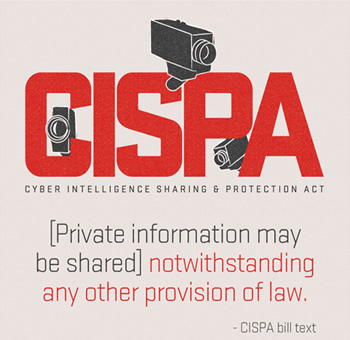The Cyber Intelligence Sharing and Protection Act (CISPA) is once again making the rounds. The bill passed the House on Thursday with a 288-127 vote. Although there appears to be a fair amount of bi-partisan support for the bill, it may yet face trouble in the Senate and at the hands of the White House though, which has threatened to veto the bill in its current form.
CISPA was originally introduced last year, a bill which encouraged businesses to "share" otherwise private information (e.g. messages, e-mails, billing information and more) about their customers and users with government agencies. In trade for this information, CISPA promised immunity to existing privacy laws which otherwise bar this type of information sharing.
The current incarnation of the bill is effectively the same one that failed last year. Unlike last year though, CISPA is not in competition with other Internet security legislation and the president has since called on lawmakers to bolster national cybersecurity measures.
Supporters believe CISPA would better enable the government to address threats quickly, skirting typical barriers like subpoenas and warrants by tossing a direct line to businesses who may offer personal information free of legal recourse.
Detractors believe the bill is too broad and represents a grave threat to privacy laws and the fourth amendment. "All it does is give the government access to your information." believes Change.org. Supporters argue this claim is a myth and truly unprovoked privacy invasion would actually be (pdf) a "rare occurrence".
"The administration still seeks additional improvements," a statement issued by the White House said. "and if the bill, as currently crafted, were presented to the president, his senior advisers would recommend that he veto the bill."
The White House also added, "Citizens have a right to know that corporations will be held accountable - and not granted immunity - for failing to safeguard personal information adequately."
Amongst the scores of tech companies who support the bill are Google, Microsoft, Facebook and Apple. However, the usual list of privacy and rights advocates have called for the bill to be stamped out once more.
